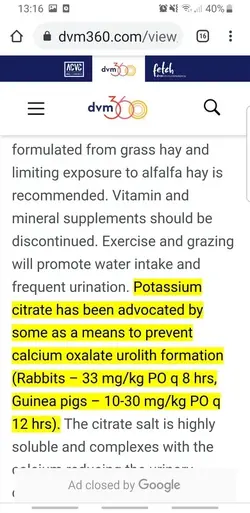Hi!
Could you please put 'Hebrides' in location in your account details (accessed via clicking on your username on the top bar); this will make it appear with every post you make and allow us to factor in your issue with exotics vet access straight away. We are dealing with members and enquiries from literally all over the world and from very different backgrounds and climates.
Encourage your piggies to have at least one or two large pees to help flush out any loose sludge by offering filtered water from a syringe, as much as they will drink willingly from the syringe in one go. Never force any water on them; that can cause more problems than it solves! Many bladder piggies are not naturally good drinkers; that is one of the more common contributing factors to sludge and stones (there are more) but not one you can change.
You can double the glucosamine dose (i.e. two capsules) during the first week.
If the potassium citrate doesn't work, would your vet be willing to speak to Simon or Kim Maddock at the Cat&Rabbit Care Clinic in Northampton? They are general vets but they see only cats, rabbits and guinea pigs in about equal measure, which means lots of piggies every week; very often ones where local vets have been struggling. The Maddocks are generally happy to help other vets with their own experiences.
Cat and Rabbit Care Clinic | Northlands Vets
My Cariad needed regular flushing back in 2012-14 after something suddenly flipped in her own (complex) calcium absorption and she made a large stone in a matter of weeks. After that, we could keep it to sludge with dietary changes with gradually lengthening intervals but she needed flushes every few months for the rest of her life until she grew to frail for them. But this was an extreme case. Anyway, she was seen at the Cat&Rabbit and had those two extra years of life to live a normal life span which she would not have had with just my local vets.
